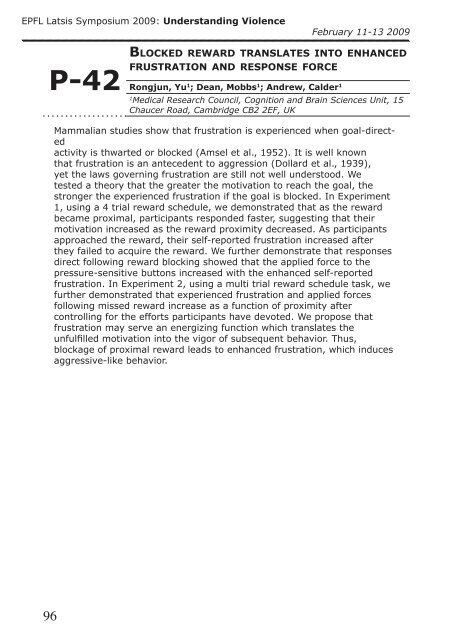Program & Abstract Book - EPFL Latsis Symposium 2009
Program & Abstract Book - EPFL Latsis Symposium 2009
Program & Abstract Book - EPFL Latsis Symposium 2009
You also want an ePaper? Increase the reach of your titles
YUMPU automatically turns print PDFs into web optimized ePapers that Google loves.
<strong>EPFL</strong> <strong>Latsis</strong> <strong>Symposium</strong> <strong>2009</strong>: Understanding Violence<br />
P-42<br />
96<br />
February 11-13 <strong>2009</strong><br />
bl o c k e D r e w a r D t r a n s l a t e s i n t o e n h a n c e D<br />
f r u s t r a t i o n a n D r e s p o n s e f o r c e<br />
Rongjun, Yu 1 ; Dean, Mobbs 1 ; Andrew, Calder 1<br />
1 Medical Research Council, Cognition and Brain Sciences Unit, 15<br />
Chaucer Road, Cambridge CB2 2EF, UK<br />
Mammalian studies show that frustration is experienced when goal-directed<br />
activity is thwarted or blocked (Amsel et al., 1952). It is well known<br />
that frustration is an antecedent to aggression (Dollard et al., 1939),<br />
yet the laws governing frustration are still not well understood. We<br />
tested a theory that the greater the motivation to reach the goal, the<br />
stronger the experienced frustration if the goal is blocked. In Experiment<br />
1, using a 4 trial reward schedule, we demonstrated that as the reward<br />
became proximal, participants responded faster, suggesting that their<br />
motivation increased as the reward proximity decreased. As participants<br />
approached the reward, their self-reported frustration increased after<br />
they failed to acquire the reward. We further demonstrate that responses<br />
direct following reward blocking showed that the applied force to the<br />
pressure-sensitive buttons increased with the enhanced self-reported<br />
frustration. In Experiment 2, using a multi trial reward schedule task, we<br />
further demonstrated that experienced frustration and applied forces<br />
following missed reward increase as a function of proximity after<br />
controlling for the efforts participants have devoted. We propose that<br />
frustration may serve an energizing function which translates the<br />
unfulfilled motivation into the vigor of subsequent behavior. Thus,<br />
blockage of proximal reward leads to enhanced frustration, which induces<br />
aggressive-like behavior.


